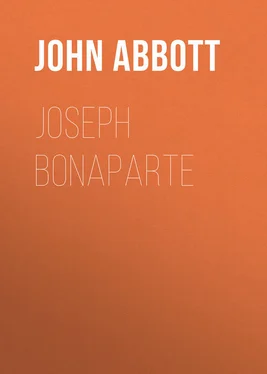John Abbott - Joseph Bonaparte
Здесь есть возможность читать онлайн «John Abbott - Joseph Bonaparte» — ознакомительный отрывок электронной книги совершенно бесплатно, а после прочтения отрывка купить полную версию. В некоторых случаях можно слушать аудио, скачать через торрент в формате fb2 и присутствует краткое содержание. ISBN: , Жанр: foreign_antique, foreign_prose, Историческая проза, на английском языке. Описание произведения, (предисловие) а так же отзывы посетителей доступны на портале библиотеки ЛибКат.
- Название:Joseph Bonaparte
- Автор:
- Жанр:
- Год:неизвестен
- ISBN:http://www.gutenberg.org/ebooks/35768
- Рейтинг книги:5 / 5. Голосов: 1
-
Избранное:Добавить в избранное
- Отзывы:
-
Ваша оценка:
- 100
- 1
- 2
- 3
- 4
- 5
Joseph Bonaparte: краткое содержание, описание и аннотация
Предлагаем к чтению аннотацию, описание, краткое содержание или предисловие (зависит от того, что написал сам автор книги «Joseph Bonaparte»). Если вы не нашли необходимую информацию о книге — напишите в комментариях, мы постараемся отыскать её.
Joseph Bonaparte — читать онлайн ознакомительный отрывок
Ниже представлен текст книги, разбитый по страницам. Система сохранения места последней прочитанной страницы, позволяет с удобством читать онлайн бесплатно книгу «Joseph Bonaparte», без необходимости каждый раз заново искать на чём Вы остановились. Поставьте закладку, и сможете в любой момент перейти на страницу, на которой закончили чтение.
Интервал:
Закладка:
Peace of Amiens.
The latter part of the year 1801, the plenipotentiaries of France and England met at Amiens, an intermediate point between London and Paris. England appointed, as her ambassador, Lord Cornwallis, a nobleman of exalted character, and whose lofty spirit of honor was superior to every temptation. "The First Consul," writes Thiers, "on this occasion made choice of his brother Joseph, for whom he had a very particular affection, and who, by the amenity of his manners, and mildness of his character, was singularly well adapted for a peace-maker, an office which had been constantly reserved for him."
Napoleon, who had nothing to gain by war, was exceedingly anxious for peace with all the world, that he might reconstruct French society from the chaos into which revolutionary anarchy had plunged it, and that he might develop the boundless resources of France. Lord Cornwallis was received in Paris, with the utmost cordiality by Napoleon. Joseph Bonaparte gave, in his honor, a magnificent entertainment, to which all the distinguished Englishmen in France were invited, and also such Frenchmen of note as he supposed Lord Cornwallis would be glad to meet.
La Fayette was not invited. Cornwallis had commanded an army in America, where he had met La Fayette on fields of blood, and where he subsequently, with his whole army, had been taken prisoner. Joseph thought that painful associations might be excited in the bosom of his English guest by meeting his successful antagonist. He therefore, from a sense of delicacy, avoided bringing them together. But Cornwallis was a man of generous nature. As he looked around upon the numerous guests assembled at the table, he said to Joseph,
Anecdote of Lord Cornwallis.
"I know that the Marquis de la Fayette is one of your friends. It would have given me much pleasure to have met him here. I do not, however, complain of your diplomatic caution. I suppose that you did not wish to introduce to me at your table the general of Georgetown. I thank you for your kind intention, which I fully appreciate. But I hope that when we know each other better, we shall banish all reserve, and not act as diplomatists, but as men who sincerely desire to fulfill the wishes of their governments, and to arrive promptly at a solid peace. Moreover, the Marquis de la Fayette is one of those men whom we can not help loving. During his captivity I presented myself before the Emperor (of Germany) to implore his liberation, which I did not have the happiness of obtaining."
Cornwallis left Paris for Amiens. Joseph immediately after proceeded to the same place. As he alighted from his carriage in the court-yard of the hotel which had been prepared for him, one of the first persons whom he met was Lord Cornwallis. The English lord, disregarding the formalities of etiquette, advanced, and presenting his hand to Joseph, said,
"I hope that it is thus that you will deal with me, and that all our etiquette will not retard for a single hour the conclusion of peace. Such forms are not necessary where frankness and honest intentions rule. My Government would not have chosen me as an ambassador, if it had not been intended to restore peace to the world. The First Consul, in choosing his brother, has also proved his good intentions. The rest remains for us."
Anecdote.
Louis Napoleon gives the following rather amusing account of this incident. "When Joseph, plenipotentiary of the French Republic, journeyed with his colleagues toward Amiens, to conclude peace with England, in 1802, they were much occupied, he said, during the route, as to the ceremonial which should be observed with the English diplomatists. In the interests of their mission they desired not to fail in any proprieties. Still, being representatives of a republican state, they did not wish to show too much attention, prévenance , to the grand English lords with whom they were to treat.
"The French ambassadors were therefore much embarrassed in deciding to whom it belonged to make the first visit. Quite inexperienced, they were not aware that foreign diplomatists always conceal the inflexibility of their policy under the suppleness of forms. Thus they were promptly extricated from their embarrassment; for, to their great astonishment, they found, upon their arrival at Amiens, Lord Cornwallis waiting for them at the door of his hotel, and who, without any ceremony, himself opened for them the door of their carriage, giving them a cordial grasp of the hand." 10 10 Œuvres de Napoleon III. tome ii. p. 456.
Hostility of the English Government.
Lord Cornwallis, however, found himself incessantly embarrassed by instructions he was receiving from the ministry at London. They were very reluctantly consenting to peace, being forced to it by the pressure of public opinion. They were, therefore, hoping that obstacles would arise which would enable them, with some plausibility, to renew the war. Napoleon continually wrote to his brother urging him to do every thing in his power to secure the signing of the treaty. In a letter on the 10th of March, he writes,
"The differences at Amiens are not worth making such a noise about. A letter from Amiens caused the alarm in London by asserting that I did not wish for peace. Under these circumstances delay will do real mischief, and may be of great consequence to our squadrons and our expeditions. Have the kindness, therefore, to send special couriers to inform me of what you are doing, and of what you hear; for it is clear to me that, if the terms of peace are not already signed, there is a change of plans in London."
Treaty of Amiens Concluded.
The treaty was signed on the 25th of March, 1802. Joseph immediately prepared to return to Paris. Lord Cornwallis, in taking leave of Joseph, said,
"I must go as soon as possible to London, in order to allay the storm which will there be gathering against me."
"When I arrived in Paris," writes Joseph, "the First Consul was at the opera; he caused me to enter into his box, and presented me to the public in announcing the conclusion of the peace. One can easily imagine the emotions which agitated me, and also him, for he was as tender a friend, and as kind a brother, as he was prodigious as a man and great as a sovereign."
Bernardin de St. Pierre, in his preface to "Paul and Virginia," renders the following homage to the character of Joseph at this time:
Bernardin de St. Pierre.
"About a year and a half ago I was invited by one of the subscribers to the fine edition of Paul and Virginia to come and see him at his country-house. He was a young father of a family, whose physiognomy announced the qualities of his mind. He united in himself every thing which distinguishes as a son, a brother, a husband, a father, and a friend to humanity. He took me in private, and said, 'My fortune, which I owe to the nation, affords me the means of being useful. Add to my happiness by giving me an opportunity of contributing to your own.' This philosopher, so worthy of a throne, if any throne were worthy of him, was Prince Joseph Napoleon Bonaparte."
Talleyrand.
While the treaty of Amiens was under discussion, Talleyrand wrote to Joseph: "Your lot will indeed be a happy one if you are able to secure for your brother that peace which alone his enemies fear. I embrace you, and I love you. I think that this affair will kill me unless it is closed as we desire."
At the conclusion of the treaty, Talleyrand again wrote: "My dear Joseph, – Citizen Dupuis has just arrived. He has been received by the First Consul as the bearer of such good, grand, glorious news as you have just sent by him should be received. Your brother is perfectly satisfied ( parfaitement content ").
Madame de Staël.
Madame de Staël wrote to Joseph: "Peace with England is the joy of the world. It adds to my joy that it is you who have promoted it, and that every year you have some new occasion to make the whole nation love and applaud you. You have terminated the most important negotiation in the history of France. That glory will be without any alloy."
Читать дальшеИнтервал:
Закладка:
Похожие книги на «Joseph Bonaparte»
Представляем Вашему вниманию похожие книги на «Joseph Bonaparte» списком для выбора. Мы отобрали схожую по названию и смыслу литературу в надежде предоставить читателям больше вариантов отыскать новые, интересные, ещё непрочитанные произведения.
Обсуждение, отзывы о книге «Joseph Bonaparte» и просто собственные мнения читателей. Оставьте ваши комментарии, напишите, что Вы думаете о произведении, его смысле или главных героях. Укажите что конкретно понравилось, а что нет, и почему Вы так считаете.












